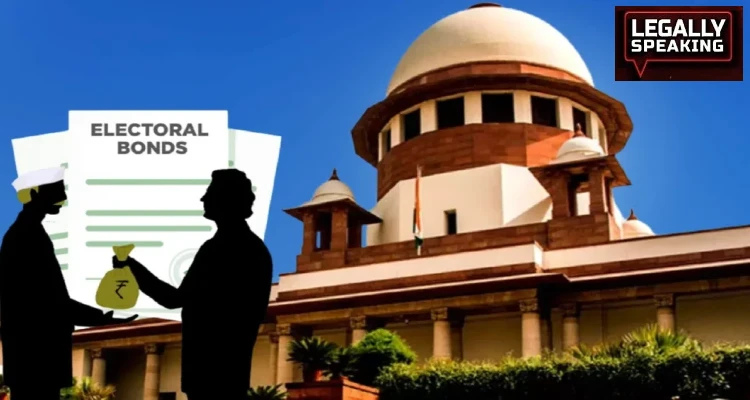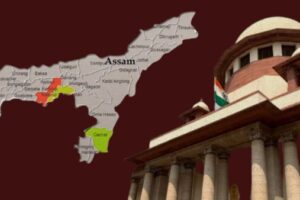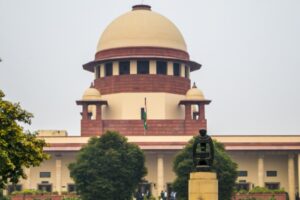
The Supreme Court, in a landmark decision, invalidated the electoral bonds scheme, deeming it unconstitutional and in violation of the Right to Information.
The Bench Comprising of Chief Justice DY Chandrachud and Justice Sanjiv Khanna, Justice BR Gavai, Justice Pardiwala and Justice Manoj Mishra emphasized the fundamental rights aspect and directed banks, notably the State Bank of India, to stop the sale of these bonds. Furthermore, SBI has been instructed to disclose details regarding donations via electoral bonds and the recipient political parties. This directive mandates SBI to share this information with the Election Commission by March 6, with a subsequent requirement for the Commission to publish these details on its website by March 13, 2024.
The Court underscored the necessity for transparency in disclosing corporate contributors through electoral bonds and highlighted concerns regarding potential quid pro quo arrangements. A Constitution bench, led by the Chief Justice, had reserved its verdict on November 2 the previous year, leading to this unanimous decision.
Transparency in Political funding
Electoral bonds, introduced by the BJP government in 2018 as an alternative to conventional monetary contributions to political parties, aimed to enhance transparency in political fundraising. These bonds operate akin to promissory notes or bearer bonds, facilitating financial support to political parties. Available in various denominations, individuals, businesses, associations, or corporations meeting Indian citizenship or formation criteria can purchase them, subject to KYC regulations. The anonymity of donors and absence of caps on bond purchase numbers were notable features.
Representation of the People Act, 1951
However, only political parties meeting specific criteria outlined in the Representation of the People Act, 1951, are eligible recipients. Despite legal challenges, including the Supreme Court’s refusal to stay the scheme in April 2019 pending further examination, electoral bonds became a significant source of funding for political parties.
Recent data revealed substantial contributions to major parties through electoral bonds, with the BJP receiving approximately Rs 1,300 crore in FY23, comprising a significant portion of its total contributions. Similarly, the Congress and other parties also benefited from this funding mechanism, although figures varied across parties and fiscal years.
Transparency in Political Funding
Electoral bonds represent financial instruments resembling promissory notes or bearer bonds, exclusively available for individuals and companies within India to contribute funds to political parties. These bonds, issued by the State Bank of India (SBI), are sold in various denominations, ranging from ₹1,000 to ₹1 crore. Importantly, donations made through electoral bonds, including those from corporate and foreign entities, enjoy full tax exemption, while donor identities remain confidential, safeguarded by both the bank and recipient political parties.
Donation Mechanism:
Purchasers can acquire these bonds through KYC-compliant accounts to facilitate donations to political parties. Upon transfer, political parties are obligated to en-cash these donations within a stipulated timeframe. Notably, there exists no limit on the quantity of electoral bonds a person or entity can procure.
Eligibility Criteria for Fund Recipients:
Per scheme provisions, only political parties meeting criteria specified under Section 29A of the Representation of the People Act, 1951, and securing at least 1% of the votes polled in recent Lok Sabha or state legislative assembly elections are eligible to receive electoral bonds.
Origins and Legal Challenges:
Former Finance Minister Arun Jaitley first introduced the electoral bonds scheme during the 2017 Budget Session, officially notified in January 2018 through amendments to the Finance Act and Representation of the People Act. To operationalize the scheme, the government enacted amendments to various statutes including the Companies Act, Income Tax Act, Foreign Contribution Regulation Act (FCRA), and Reserve Bank of India Act.
Legal challenges ensued, with several petitions filed in the Supreme Court by entities like the CPI(M), Congress, and various NGOs, questioning the constitutional validity of the scheme. Commencing on October 31 the previous year, hearings centered on its legality and potential implications for national integrity.
Petitioners argued that the scheme encroaches upon the right to information, facilitates misuse by shell companies, and fosters corruption. Senior advocate Kapil Sibal, also a Rajya Sabha MP, expressed concerns over potential diversion of donations for purposes beyond electoral expenses.
Finance Act 2017
The electoral bond scheme was introduced by the Modi government through an amendment to the Finance Act 2017. Association for Democratic Reforms (ADR), Communist Party of India (Marxist) and Congress leader Jaya Thakur, among others, filed a petition in the Supreme Court against this plan. The petitioners argue that these bonds, linked to electoral donations, undermine transparency in political funding and violate the voters’ right to information. They argued that the scheme promotes the practice of making political donations through shell companies. Due to which the accountability regarding financial help received by political parties during elections is reduced.
Safety of donors
In defense of the scheme, the central government has emphasized its role in promoting the use of legitimate money in political financing, ensuring transactions through regulated banking channels. Additionally, the government stated the need to protect donors from potential retaliation by political entities.
Questions of the Bench
During the hearing, the bench asked several questions to the government. The bench also questioned the logic of ‘selective secret donors’ of the electoral bonds scheme. The bench expressed concern about its attempt to institutionalize bribery of political parties. Specifically, the bench raised the issue of unequal donations to different parties. Because the ruling party potentially gets more donations. Instead of those parties which are in opposition. Additionally, the bench also raised questions over the removal of the cap





